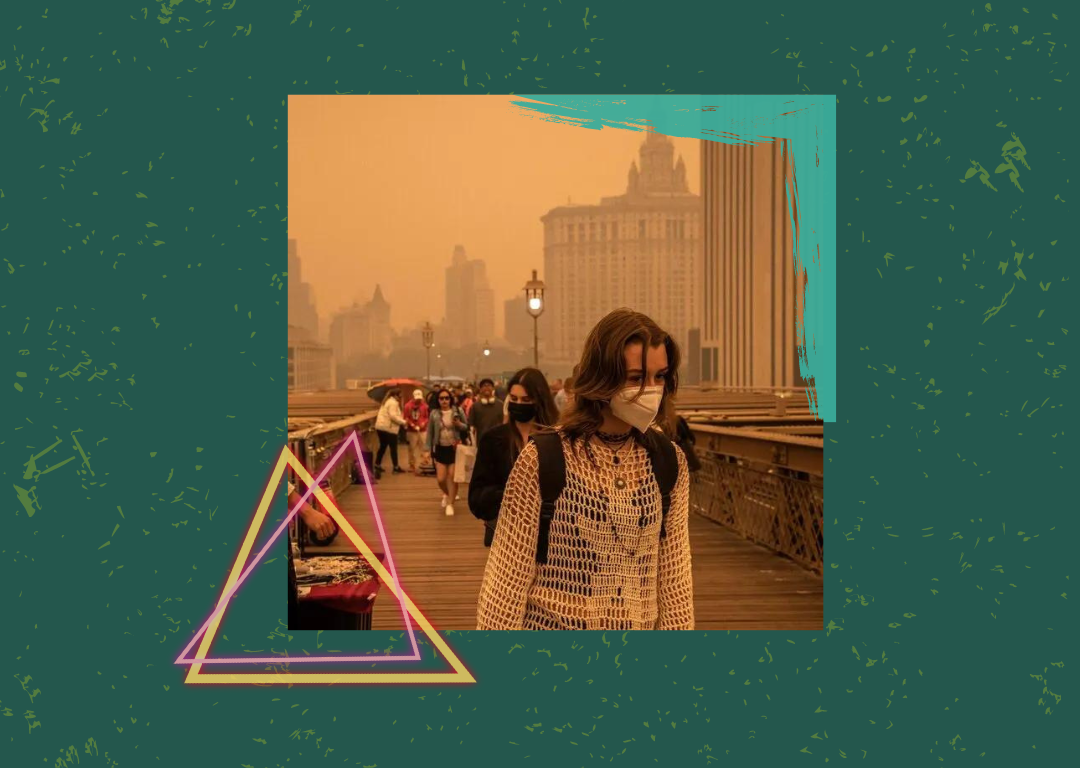
Climate Change: Causes, Effects, and Why We Can't Lose Hope
Climate change seems like an insurmountable topic, and pretty bleak in terms of what we can do about it. In this article I’m breaking down the basics of climate change: the causes and effects, what our governments are doing to fight it, and why, individually, we can make a difference.
What is Climate Change?
We can sometimes lose sight of what climate change actually is. But, climate change isn’t that complicated.
Climate change does what it says on the tin: it changes the climate.
We usually use it to refer to an increase in global temperature, but that's not all climate change means, that's more global warming. Sometimes, the increase in temperature is a natural one. For example, climate change might happen because of a volcanic eruption.
Unfortunately though, most of the time, climate change is down to human activities…
Climate Change Causes: Greenhouse Gases
Climate change is primarily caused by burning fossil fuels. Fossil fuels are coal, oil and gas. By burning fossil fuels, certain gases are released, and these gases trap the heat from the sun around the earth, and cause the temperature to rise- and the ‘climate’ to ‘change’.
This is called the greenhouse effect.
NASA have a list of the four main gases (you might have heard the term, 'greenhouse gases') that lead to climate change:
- The first is carbon dioxide. This is released when we burn fossil fuels, but is also caused by mass deforestation.
- Next, is methane. Methane is released from landfill sites and farming. For example, livestock produce methane during digestion.
- Thirdly: Nitrous Oxide. Farming is also a major cause of this, especially the production of fertiliser.
- And finally, one you might not have heard of: Chlorofluorocarbons. These molecules don’t exist naturally. They are only produced by us. You find them in spray cans and refrigerants.
Effects of Climate Change: From the Arctic to the UK
Everything so far has been quite theoretical. And sometimes, climate change can feel like that. But the effects of climate change are anything but theoretical.
Let’s start off with the basic effects of climate change. The UN has stated that the global average temperature temperature is 1.1°C warmer than before the industrial revolution, and the last decade (2010-2020) was the warmest on record. Climate change means that the earth is getting warmer.
Obviously though, the knock on effects of the earth getting warmer are vast. The UN reminds us that everything on earth is connected. The effects of climate change, and the earth getting warmer, are catastrophic!
Here are some obvious climate change examples that we are already seeing (there is some positivity towards the end of this article, promise):
Increased Precipitation and Glaciers Melting- Flooding and Drought:
Increased flooding is caused by climate change in a number of different ways. As the temperature increases, our air can hold more water vapour. This leads to heavy rainfall, increasing the likelihood of flooding.
This problem is exacerbated by the decrease in soil quality due to a decline in our ecosystem. Our soil can hold and absorb less water, and long periods of drought mean that the soil is dry when the rail falls, meaning it is harder still for the water to be absorbed.
Flooding has disastrous effects on communities and livelihoods, and disproportionately affects developing countries. However, climate change also causes periods of drought. This causes intense water shortages, and affects crop yields.
Wildfires caused by Global Warming:
This risk of extreme weather events, like wildfires is increased as the temperature rises, and our soil moisture decreases, which are both caused by climate change.
We saw the devastating effects of wildfires in Australia in 2019, and we are seeing it again in Canada this month, leading to smoke covering large parts of North America. You can read more about the Canadian wildfires and their impact on air quality, here. And check out our video below, explaining more about the changes in air quality caused by the fires.
Poverty and Hunger:
The factors above inevitably lead to exacerbating poverty and hunger. Droughts and failing water supplies lead to crop shortages, weakening the economy of whole communities, as well as leaving them without food.
Action Aid have stated that the effects of climate change are hitting the world’s poorest people the hardest. They estimate that by 2030, climate change will have ‘pushed more than 120 million more people into poverty’.
Developing countries are often the smallest contributors towards CO2 production and climate change, but they are the countries that do not have the resources needed to adapt to the changes being caused by climate change.
Human Health Risks:
The World Health Organisation has stated that between 2030 and 2050, climate change will have caused about 250,000 more deaths every year.
Crop shortages will lead to malnutrition, and working outdoors during heatwaves will become more dangerous as temperatures continue to increase. Diseases like lyme disease will spread faster because of the change in temperatures leading to more ticks.
Can we Stop Climate Change?
This is the big one. Can we stop climate change? I have good news- we can! Let’s look at what is already happening to work towards stopping climate change, and then what we can do.
Fighting Back Against Climate Change
Governments and intergovernmental panels are taking action. It has been agreed by governments across the world that we need to limit the temperature increase to 1.5 °C which would limit the harshest of the climate change impacts. However, currently, the policies in place will only result in the temperature change being kept to a 2.8°C increase.
There are also intergovernmental treaties and agreements. Examples of these include the Paris Agreement, which was signed at COP 21 in 2015, and the UN framework convention on climate change.
You can read more about the Paris Agreement, and whether we are on track to reach these goals, here.
Some big businesses are making commitments to reducing their impact on the planet, or even helping to slow down climate change. Patagonia donated its profits to a charitable trust committed to saving the planet last year. And Unilever, which is the parent company of brands like Ben and Jerry’s and Dove, have plans in place to achieve net zero emissions by 2030.
There are also climate activists trying to get the attention of governments in an effort to speed up climate conscious policies and laws. Just Stop Oil activists are disrupting traffic and high profile events in the UK. Below is an example of this disruption at a rugby match.
What YOU Can Do to Stop Climate Change
I can’t actually take any credit for this section, because until about two weeks ago I was feeling very angry, and very hopeless.
Then I read Alastair Campbell’s new book, ‘But What Can I do?’. The book is not a love letter to climate change activists. It is a guide on how an ordinary person, who is frustrated about the political and economic state of the world right now, can turn their frustration into positive action.
Because, up until I read this book, I did think there was nothing I could do. I was (quite rightly), blaming government inaction and big businesses pumping out CO2, for our rapidly disastrous approach to climate change.
Campbell has changed my perspective. He emphasises the need to stay hopeful, because without it, we have lost the fight. And he stresses the power of the individual. He debunks the myth that one person can’t make a difference to the world.
In the context of climate change, he uses Greta Thunberg as an example. She was one woman who has changed an entire generation’s outlook on climate change. But more importantly than this, Campbell reminds us that it doesn’t matter that we can’t all be 'Gretas'. Because, we can all be inspired by her to do our bit.

(Image courtesy of The Guardian)
I often look at my recycling bin and laugh. Why am I going through all this trouble only for oil companies to continue making billions whilst having catastrophic effects on our planet?
Campbell has literally given me an answer to this. Small changes add up; small changes have effects on the people around you. If you go plastic free, eventually a friend will notice. They might go plastic free. If we all stop buying plastic bottles from supermarkets, eventually they will stop stocking them.
He admits, these are slow ways to enact changes that need to happen fast- that need to happen immediately, actually. But, just because you can’t do everything, doesn’t mean you should do nothing.
Have Hope...
Lots of this article has been quite miserable. But if you take away one thing, let it be that you have the power to fight against climate change. The production of carbon dioxide and the burning of fossil fuels might be out of your control, but that doesn’t mean you are in control of nothing.















